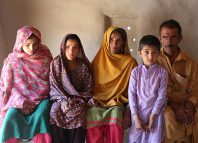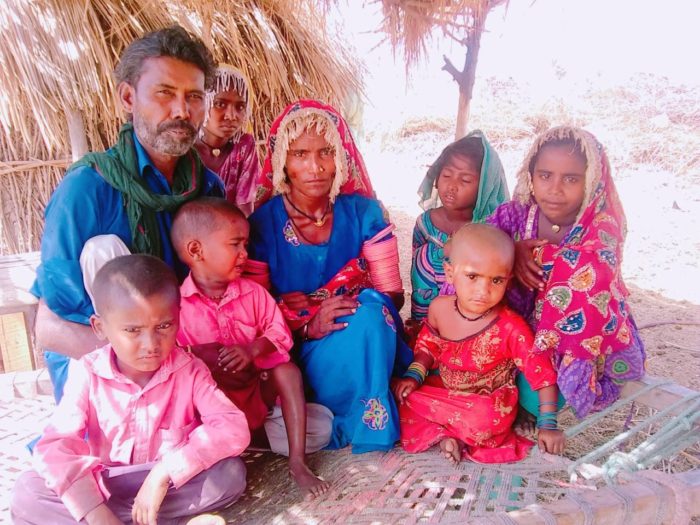Champa and her family learn more about the virus while experiencing COVID-19 led household poverty in Pakistan
Thirty-eight-year-old Champa is a mother to six children and a wife of a daily-wage carpenter belonging to St. John Colony in Umerkot. Both Champa and her husband are physically impaired and the family’s only source of income is her husband’s daily labour.
St. John’s colony is basically a remote village that has a difficult access and hardly any basic facilities like health centers, schools or market places. With a meagre income that is insufficient to meet the needs of a family of eight, Champa has always been struggling to feed her children well and fulfill their everyday needs.
“My husband works only when someone requests for him or there is a general call for carpentry. The days that he does work, he earns PKR 600 (US $ 3.5) a day, which is immediately consumed to purchase kitchen essentials such as flour, oil and lentils. We cannot afford to send our children to school with this income. We barely make ends meet and sometimes save a small amount to meet our healthcare expenses when needed.”
In early March this year, Champa had not been feeling well and was advised by her relatives to visit the health facility located in Samaro village of Umerkot district. This health facility is set up and operational under Community World Service Asia and Act for Peace’s health project. Under the said project, CWSA is providing clinical health support in two Taulka Headquarter Hospitals (THQs) in district Umerkot with focus on Maternal, Newborn, and Child Health (MNCH) Services. The health services includes routine outpatient services (OPD), provision of free of cost essential medication and a full range of preventive and curative health services and continuum of care including family planning, newborn care, and child health. Other community based interventions includes formation of Village Health Management Committees and their capacity building. The health centers are facilitating in addressing the health needs of the community and in raising awareness on health issues and rights of women and children. At the Samaro health center, which is, just two kilometers away, Champa was diagnosed with and treated for diarrhea and was straightaway delivered a wheelchair as well.
Like many other families in Pakistan and even across the globe, Champa’s family has also been gravely affected by the COVID-19 pandemic. It has multiplied the economically struggling family’s challenges and have left them penniless.
“There is no work and no income now. Most of the days, my children sleep with an empty stomach because we cannot even afford a single meal in a day. We have no money to buy flour, rice or even a few vegetables. We did attempt to loan off some money from our relatives and friends but everyone around us is in a tough spot. COVID-19 has affected everyone, mostly financially.”
Sindh’s merciless summer has not made it any easier for Champa’s family. Extreme heat and sky-rocketing temperatures have left her children dehydrated and with little or no food, their immune systems have become very weak, catching infections easily. Her children have suffered from heat induced diarrhea, throat infections and high fevers ever since the pandemic hit the region. Alarmingly, Champa has nowhere to take her children for health care as the nearest health centre in Samaro is now closed due to the pandemic driven lockdown. Travel bans and financial limitations have restricted them from accessing other hospitals or clinics located farther off.
“I cannot even think of taking my children to any other hospital other than the one in Samaro because we cannot afford it. We do not have the money to pay consultation fees, buy medicines or travel,” shared Champa.
Despite the temporary closure of the health centre, Community World Service Asia’s teams have initiated awareness sessions on prevention and safety from Coronaviruses 19 for many communities living in the Umerkot district. These sessions are planned and conducted in coordination with local government health departments, Community Health Management and Village Health[1] committees. Working collaboratively, the teams are raising awareness as part of a larger effort to unify communities to prevent the further spread of the virus in the area.
The health sessions on coronavirus focus on limiting movement, avoiding small or large gatherings, maintaining social distancing and healthy hygiene and sanitation practices. The teams utilised the vast array of informational educational material (IEC) available on the COVID-19 and translated it in local languages and thoroughly oriented the communities on it.
Village Health Committee members of St. John Colony delivered a training on COVID-19 awareness and safety measures against it and shared relevant awareness raising material with their fellow community members. Champa and her family participated in one of the sessions conducted in April, 2020.
“We know what the coronavirus is now. We learnt to keep our loved ones safe at home and adopt clean hygiene to avoid the spread of the virus. My children wash their hands frequently and do not play outside their home. They are mostly engaged in small indoor games now. My husband and I only go outside our home when there is a dire need. This is a dangerous virus and we have to stop the spread so that everything can be as normal as it was in 2019 for my husband to start work again and earn a living for our family,” expressed Champa.
[1] CWSA formed Health Management Committees (HMCs) at Taulka Level and Village Health Committees (VHCs) with equal representation of women and men (5 women and 5 men). The purpose of these Committees is to build and maintain accountability mechanisms for community-level health services provided by the Community World Service Asia and Government Health Department. The Committees play an important role in planning and monitoring of the health care services in collaboration with CWSA health team.







